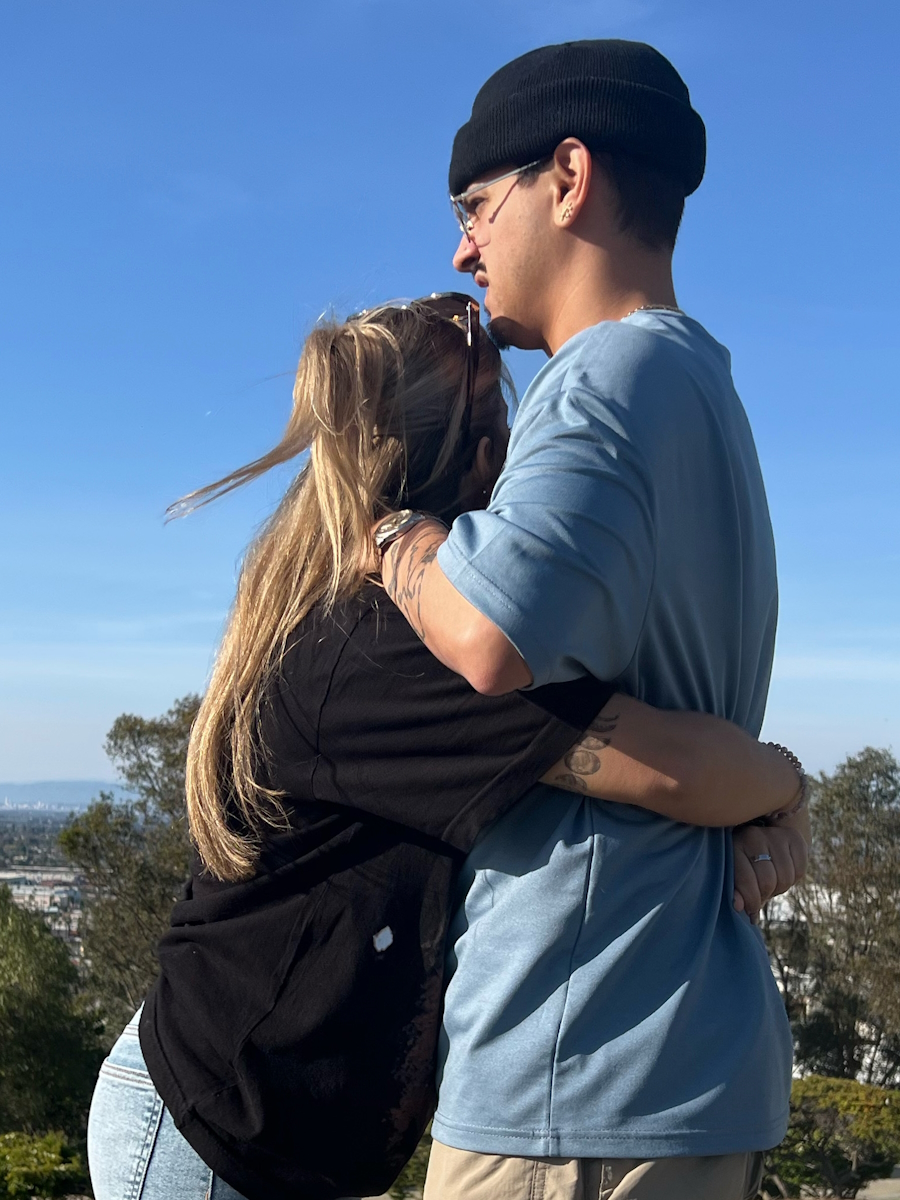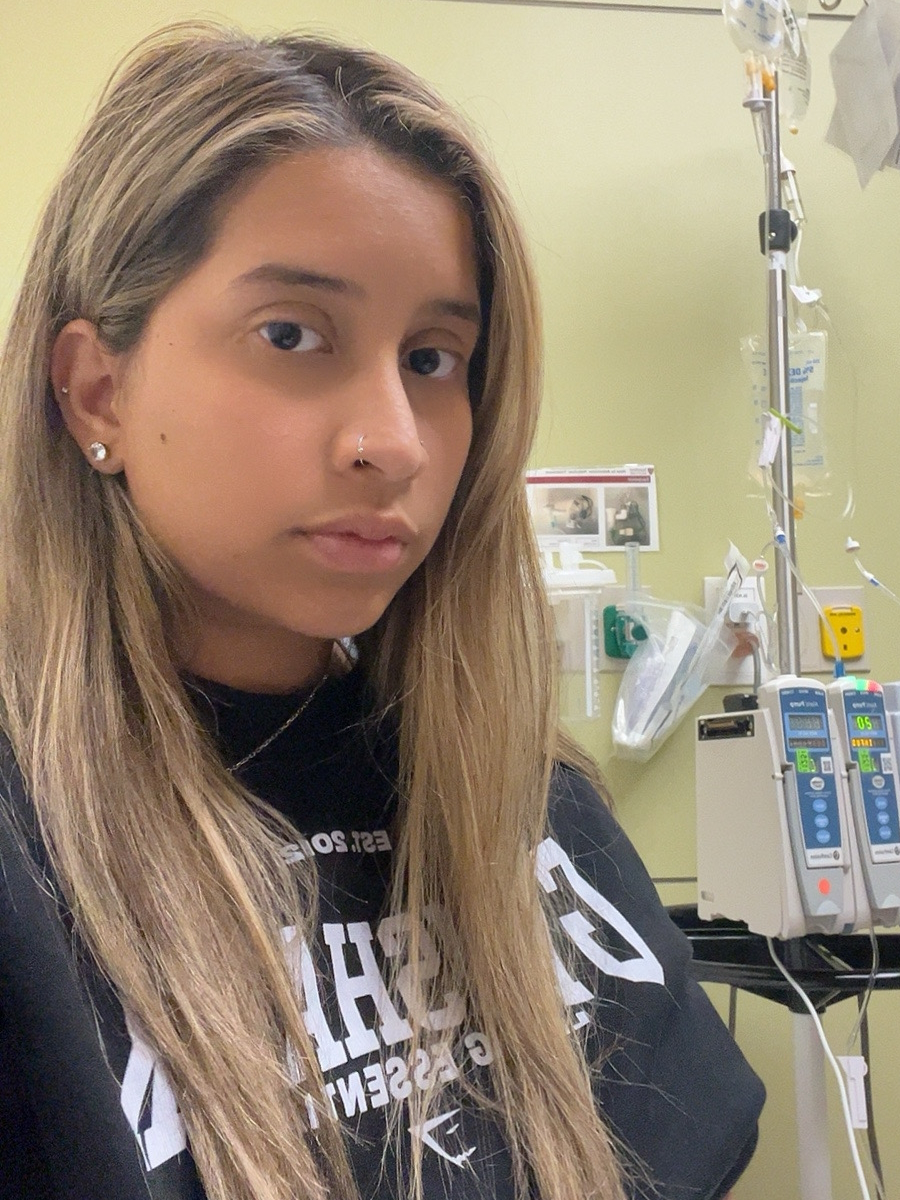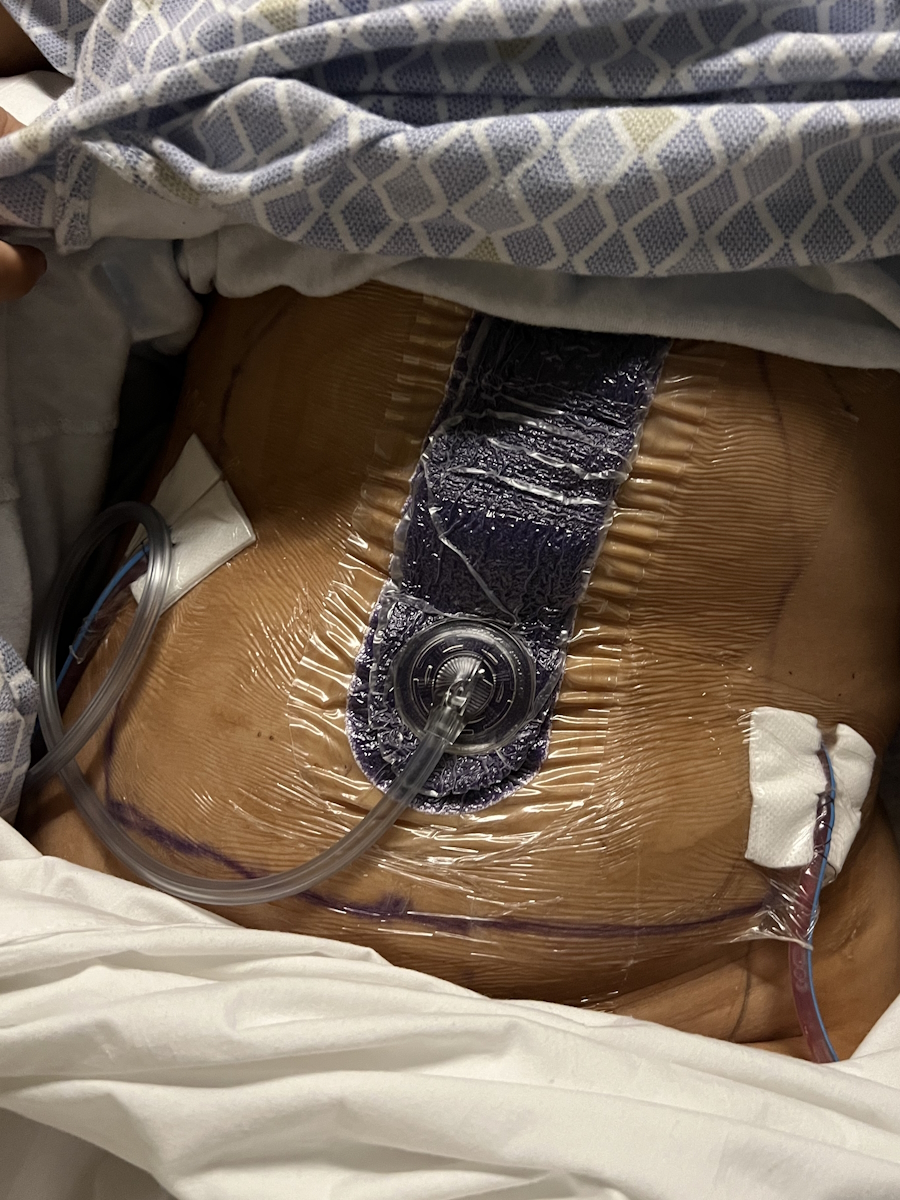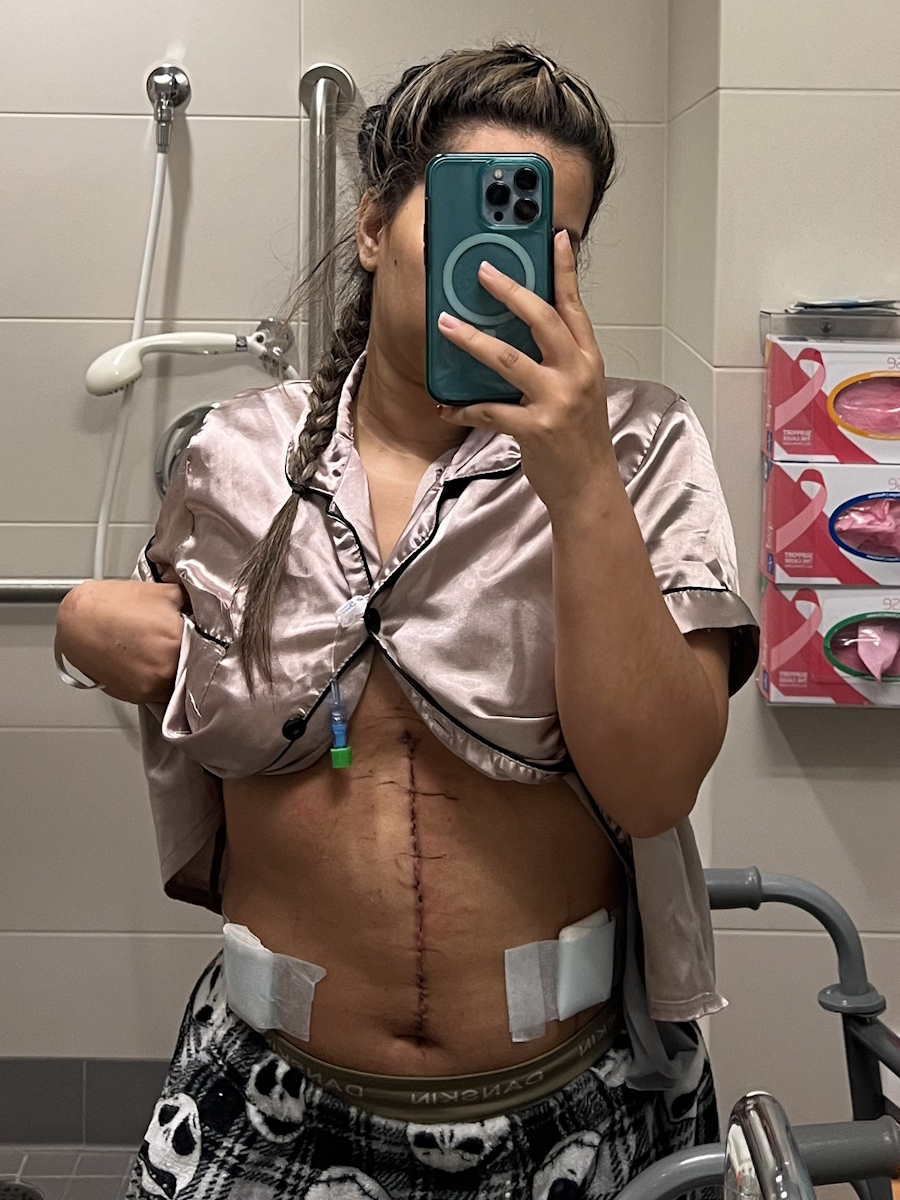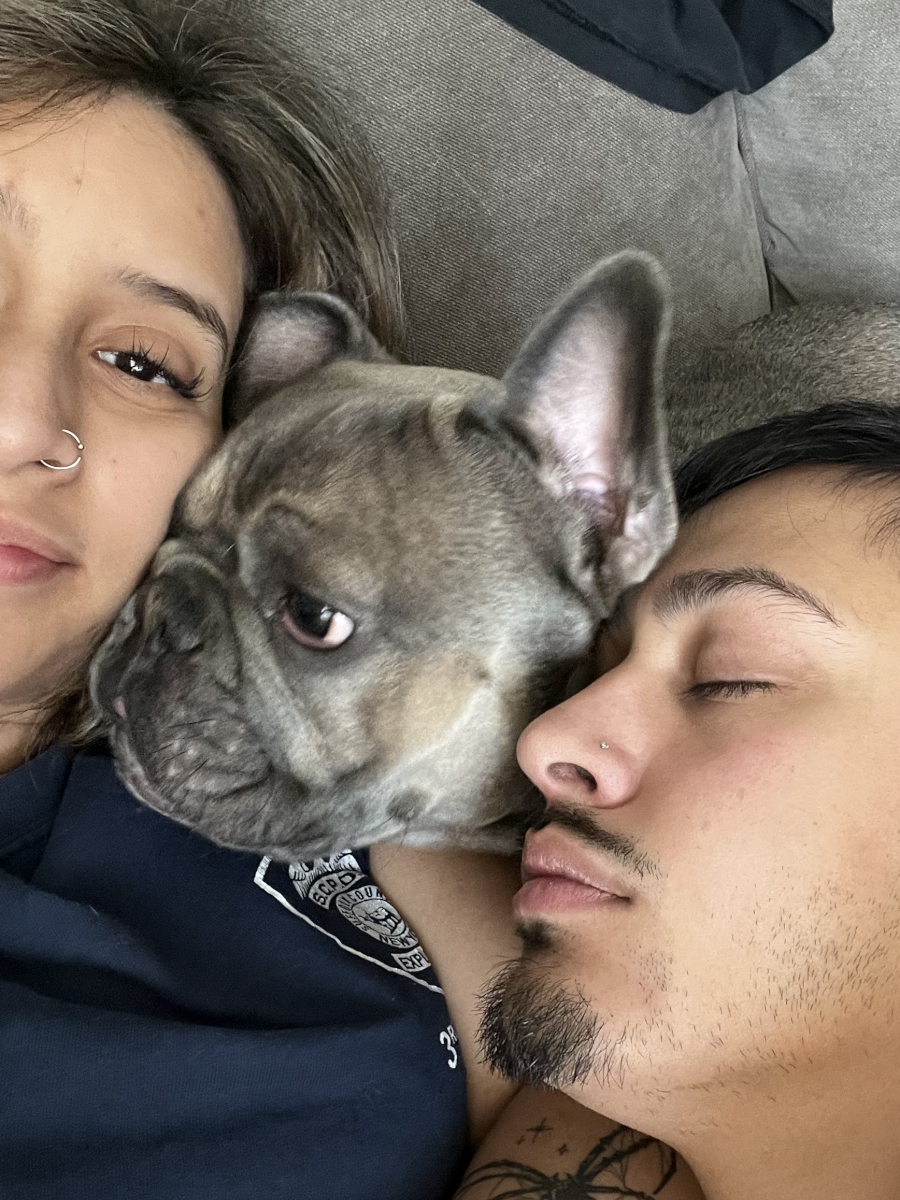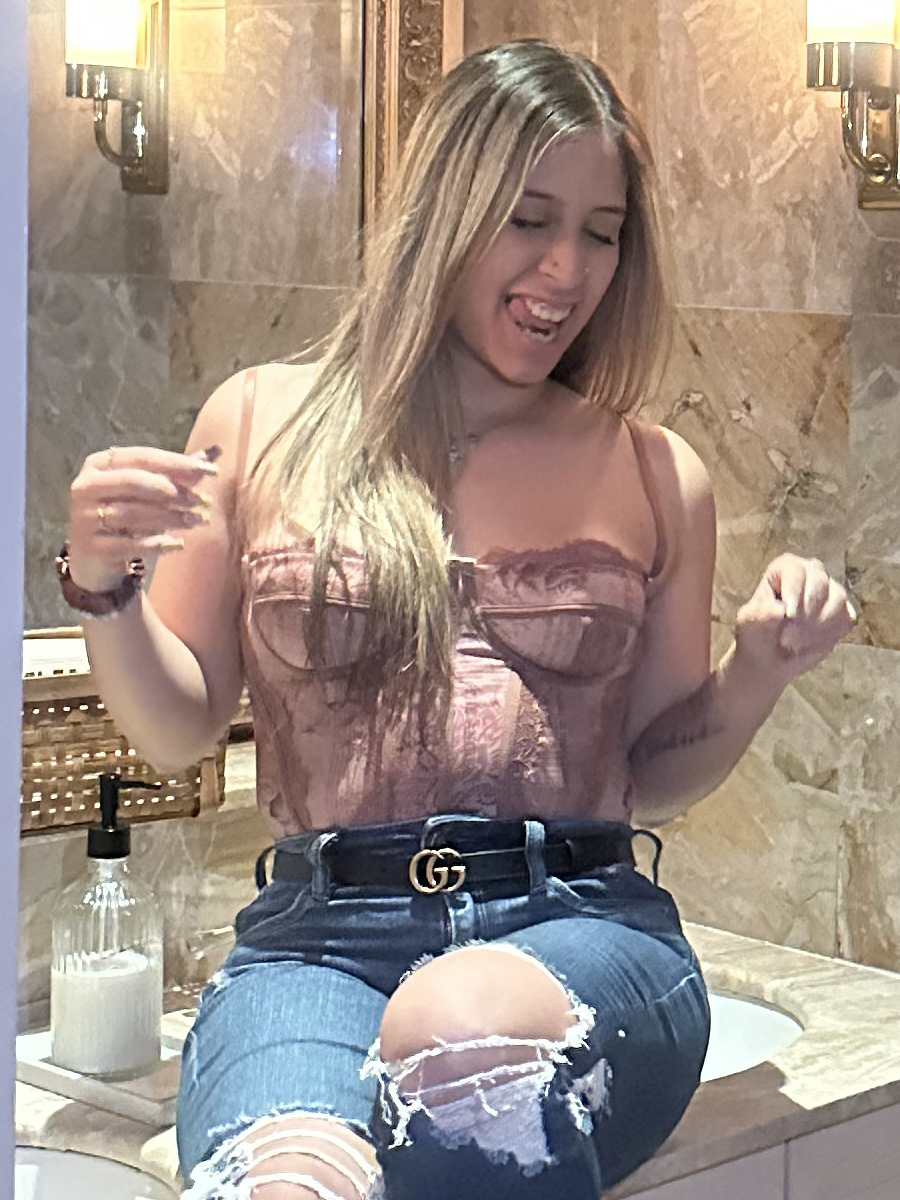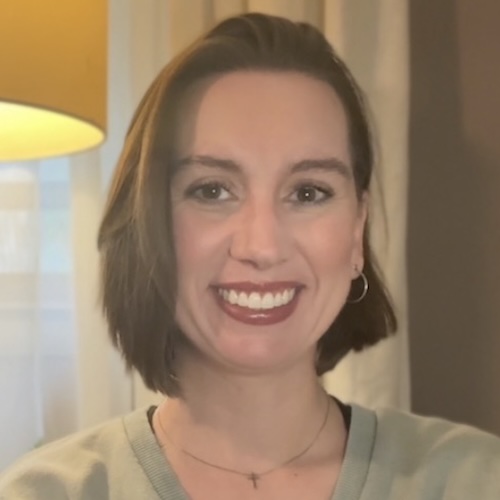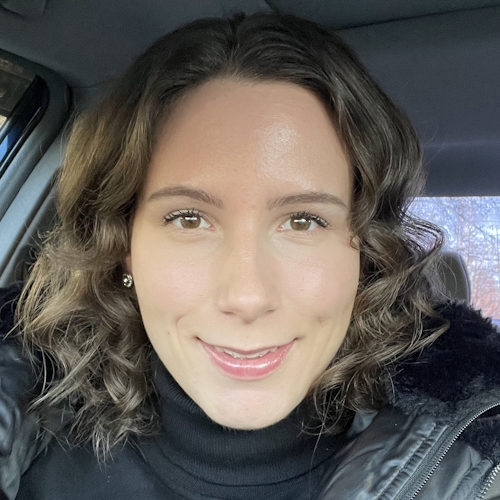How Tabbie Faces Stage 4 Neuroendocrine Pancreatic Cancer at 25
When Tabbie first heard the words “It’s cancer,” she was just 25 years old, full of energy, and living her life in the Bay Area while working at a hospital. She didn’t think she had symptoms. After all, who wouldn’t feel tired after working long night shifts and driving an hour and a half home? But after a sudden, sharp abdominal pain that grew worse by the day, she decided to seek medical care, a decision that changed everything.
Interviewed by: Nikki Murphy
Edited by: Katrina Villareal
At urgent care, the pain was so severe that even a gentle touch was unbearable. After multiple scans, doctors discovered tumors in Tabbie’s pancreas and liver. Soon, the diagnosis became clear: stage 4 neuroendocrine pancreatic cancer. Hearing that news was devastating, especially since a close friend had recently died of cancer. Tabbie’s first thought was, “I’m going to die,” but she quickly realized that she didn’t want this diagnosis to define her.
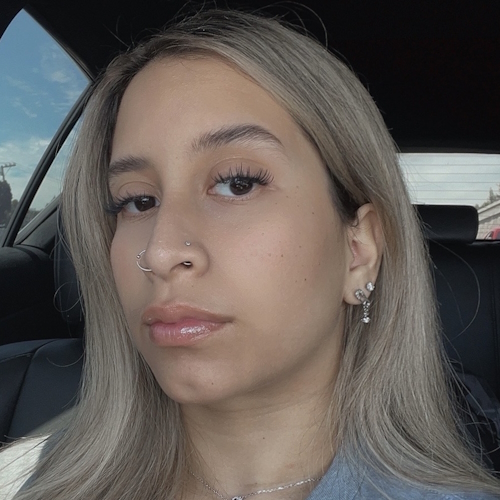
What makes Tabbie’s story especially powerful is the way she leaned into humor and positivity, even in the darkest moments. She cracked jokes with her nurses, tried on wigs for fun before chemo, and kept her spirit alive by staying connected with friends and support groups.
Still, the weight of decisions was heavy, especially when her medical team talked about freezing her eggs. At 25, Tabbie never thought she’d be injecting herself with hormones to preserve her fertility, but she chose to embrace the process and hold onto hope for the future.
Preparing for her first chemotherapy treatments was overwhelming. Tabbie started with oral chemo, hoping for a gentler option, but when it didn’t work, she moved to IV chemo and eventually underwent a Whipple procedure, also known as pancreaticoduodenectomy, along with a liver resection. (Editor’s Note: A pancreaticoduodenectomy, commonly known as the Whipple procedure, is a complex surgery to remove cancerous tumors from the pancreas. It involves removing the head of the pancreas, the duodenum, part of the bile duct, and the gallbladder.)
Surgery was frightening, but she found strength in the fact that her care team was made up of trusted colleagues from her own hospital. That trust, along with support from social workers, nurses, and online communities, became her anchor.
Even after surgery, Tabbie faced challenges like digestive issues, dietary restrictions, and the emotional impact of feeling “different” from others her age who were building families or careers. Despite all this, she continues to choose joy, reminding herself and others to love their bodies, ask for support, and not let negative thoughts take control. She openly shares her experience on social media and in support groups, offering advice to others preparing for Whipple surgery or chemotherapy.
Tabbie’s story highlights not just the medical side of neuroendocrine pancreatic cancer, but the deep mental health impact of survivorship. By speaking candidly about her fears, choices, and resilience, she empowers others to take control of their care, honor their feelings, and know they’re not alone.
Watch Tabbie’s interview or read the full transcript below to find out more about her story:
- How Tabbie turned fear into laughter while preparing for chemo
- The surprising age when she was told to freeze her eggs
- Why she trusted her medical team like family
- The hardest part of recovery after her Whipple procedure
- How support groups and social media gave her strength on tough days
- Name: Tabbie V.
- Age at Diagnosis:
- 25
- Diagnosis:
- Pancreatic Neuroendocrine Tumor (pNET)
- Staging:
- Stage 4
- Symptoms:
- Abdominal pain
- Unusual organ “inflammation” feeling when walking
- Fatigue
- Treatments:
- Chemotherapy: oral and IV
- Surgeries: Whipple procedure (pancreaticoduodenectomy) and liver resection (partial hepatectomy)
This interview has been edited for clarity and length. This is not medical advice. Please consult with your healthcare provider to make informed treatment decisions.
The views and opinions expressed in this interview do not necessarily reflect those of The Patient Story.
- Hi, I’m Tabbie
- I didn’t think I had any symptoms
- I decided to go to urgent care
- The moment everything changed
- The cancer had spread
- Working in a hospital, I had direct contact with a great medical team
- I never imagined I would have to worry about my fertility at 25 years old
- The treatment plan I chose
- I’m taking control of my treatment moving forward
- I’ve had to adjust my diet and workouts
- Where I find support
- What I want others to know
Hi, I’m Tabbie
I’m a very loving and fun person. You’ll never see me upset because I don’t have that mentality where I need to let people know that something’s bothering me. I’m usually cracking jokes.
About four years ago, I moved to the Bay Area in California and I’ve been working at a hospital ever since.
I didn’t think I had any symptoms
I didn’t have any symptoms, or at least I didn’t think I had any. I work swings, so I go into work at 3 p.m. and get out by 1:30 in the morning. At the time, I lived far from work, about an hour and a half away, so the drive was exhausting and I assumed that’s why I was tired.
But one Monday, I was on a caregiving job in LA for an older woman, which involved lifting her off the chair and putting her anywhere she wanted. She was petite, but I’m also petite. I’m only 4’11. The following day, I called in sick because I had abdominal pain. I didn’t know if I was sore or if it was actual pain, so I ignored it. It was something that I hadn’t experienced before, but I let it go until Wednesday.
I had to fly back to the Bay Area for work and my abdomen hurt a little more, but it was a weird pain because every step I took, I felt my organs were inflamed. When I arrived, I texted my boss and asked if it was okay if I went to urgent care once the following person came in and she told me to go immediately.
I decided to go to urgent care
I was physically at the hospital, but I didn’t want to go to the emergency room, so I went to urgent care. The pain was intense. When the doctor palpated my stomach, he couldn’t even touch me; that’s how painful it was. I thought the worst, like twisted or dead bowels.
He said, “You need to go to the emergency room.” I said, “Do you think it has to do with my bowels being twisted?” He said, “I don’t know, but you need to get a scan done.” The hospital was a five-minute drive, so I went back to where I worked, but to the emergency room. I felt weird because I was in my scrubs, sitting in the waiting room, so people were looking at me.
When they finally took me in, they did a series of scans and asked me questions. I didn’t have a fever, diarrhea, nor was I throwing up. They asked me if I was around livestock or if I had left the country. They were wondering what could possibly be causing my symptoms. They did an ultrasound and that’s when they saw that I had cysts. Then they asked if I had been around a sick dog. My dog has been throwing up for a day, but nothing horrible. They thought that’s what it was and that I had a tapeworm. They decided to do a scan and saw it in my pancreas and liver.
They didn’t tell me that they still thought it was a tapeworm as I got admitted into the hospital. I was speaking back and forth to a bunch of doctors and eventually, one of them came in and said, “It’s cancer.” I didn’t know what to think. It was like how you always wondered. Nonetheless, my mom and my boyfriend were there.
Thankfully, with the type of cancer that I have, I know a surgeon whom I work with and who specializes in Whipple procedures, pancreatic damage, and liver surgeries. I contacted one of the nurses whom I work with. She’s my charge nurse. She said, “This is the doctor you’re going to see.” It worked out for me in the end because I had a care team that knew me and I was able to pick out my team because I worked alongside them.
The moment everything changed
As soon as they diagnosed me and told me that I had cancer, I started crying. That’s a normal reaction for everyone. The first thing that popped into my head was, “I’m going to die.”
It’s still hard to talk about it. How do I explain it? A year before I got diagnosed, I had a friend who passed away from cancer, so that’s the first thing that popped into my head. Obviously, no one should think that way, but, unfortunately, that’s the reality of things. That’s the first thought, “I’m going to pass away.” As time went by, after I cried it out, I realized that I can’t let cancer determine who I am.
Another thing that popped into my head was the thought of losing my hair. Immediately, I got on Amazon for wigs. My boyfriend’s sister loves to wear wigs to style them, so one day, I came over to her house and she said, “This wig would look good on you.”
A whole bunch of negative thoughts popped into my head and I realized: what good is that going to do for me? I’m not that person. I’m not a sad person. I’m always the life of the party. I always like making people laugh in the most uncomfortable situations.
That’s what I did when I was in the hospital. I was waiting for a biopsy on my pancreas and they didn’t let me eat for close to 34 hours. I made a joke to the nurses, which I probably shouldn’t have in that moment. I said, “I guess hunger is going to kill me before the cancer does.” They all looked at me like, “Are you okay?” It’s just a joke. That’s how I cope.
The cancer had spread
I was still admitted to the hospital during all this. On the first night, I had CT scans, an MRI, and ultrasounds. I was in the hospital for three days. They wanted to do a biopsy on my liver, but based on the scans, they saw that the tumors were fluid-filled, so they decided not to mess with them. They went to the pancreas to look at the two tumors there.
I was waiting and wasn’t allowed anything by mouth for the whole day. Finally, they brought me down to get an EGD (esophagogastroduodenoscopy) done, where they put me to sleep, so they could put a tube down my throat and biopsy my pancreas. I got the results the following day. I don’t remember exactly what test they wanted to do, but I knew that the section where they wanted to do the test didn’t run on weekends. I said, “I work at the hospital. It’s not like I’m going anywhere. Can I just go home and be scheduled for whenever I need to do that?” They agreed and were able to discharge me.
I followed up the next week to do the test to confirm the type of cancer it was, which was neuroendocrine. But it was a series of waiting games because initially, they told me it was stage 1. Unfortunately, they could not test the liver due to the fluid-filled sacs. I remember getting that phone call and they said it was stage 4 because it metastasized to my liver. From what I remember, I had two large tumors on my pancreas and about 17 on my liver.
When I heard it was stage 4, it was a little more serious for me because they hadn’t given me any information while I was in the hospital. The most that I could do was cry because I was sick.
Immediately, I ran to Doctor Google. I searched “pancreatic cancer stage 4” and I read that pancreatic cancer is the deadliest and that people don’t find out about it or get symptoms from it until they’re at the end stage, so that scared me even more. Why am I on Google? Let me get off of this because it’s not doing me any good.
I cried more when I heard it was stage 4 than I did when I was in the hospital, mostly because I was by myself. I didn’t have a circle of doctors where I was trying to hold back my tears to be able to talk to them. But it was scary because it was just me and my best friend in the house, but she was sleeping because she had just gotten home from a shift, so I didn’t know what to do. I was going crazy. I needed to talk to someone about this and everyone’s at work. I ended up waiting until she woke up, walked into the room, and dropped the news on her.
At this time, I was doing my prerequisites to apply to the nursing program. I was also in the process of moving out of the Bay Area and into LA with my boyfriend. Everything had to be put on hold. Because my care team was in the Bay Area, I decided to stay at my job because I have my doctors right there and for insurance reasons. If I moved to LA, I didn’t know if I would find a good job that would provide good insurance. I had to put school on hold. I had to focus on myself.
There are a lot of things you don’t realize that people go through before they start chemotherapy. I was only 25 at the time. They told me about freezing my eggs. I was injecting myself three times a day. Sometimes I’d be too scared because I don’t like needles, so I would ask one of the nurses to inject me. I was constantly going back and forth between the Bay Area and LA until I started chemo. That’s when it got a little harder because I couldn’t travel as much. I felt like I was getting sicker.
Working in a hospital, I had direct contact with a great medical team
I was lucky enough not to run into any issues because I had resources. It all unfolded. I had a lot of people by my side helping me and making sure that I was on the right path. People around me in the hospital didn’t know that I had cancer. Everyone was in the dark but we made it work.
I had contact with my surgeon. He provided his cell phone number and told me that if I had any questions, I could text him. I had a social worker who gave me all the information, sent me everything through my health portal, and said, “If you have any questions, reach out to this person. If you want to know more information, here’s a link to information from different sites.”
My surgeon initially told me that the end goal would be to go through a Whipple procedure (pancreaticoduodenectomy), but he would like me to have chemotherapy first. He wanted to shrink the tumors as much as possible, so it’d be a lot easier to go in there.
But he did give me some treatment options. The first one was a clinical trial. I don’t remember if it was radiation, but he told me that one of the risks would be potentially having a different type of cancer, potentially a blood cancer, down the line. I said, “Why would I want to treat this cancer and then risk getting a different type of cancer in the future?” Then he gave me another option, which was oral chemotherapy, and see how that plays out. If that worked out, we would continue with that and if it didn’t, we would start IV infusions.
I never imagined I would have to worry about my fertility at 25 years old
When they told me that I should potentially freeze my eggs, I said, “Let’s do it.” I’m 25. I don’t have any kids. I would like to have the opportunity to have kids. I didn’t know what I was getting myself into. I didn’t know what the process was.
I had my first consultation and they explained it to me. They said I would be injecting myself. I would be coming in every other day to get a transvaginal ultrasound. They’re going to get bloodwork done every day to monitor, which was painful in itself. But the silver lining of that was when I would get my ultrasound done, the doctor would say I was very fertile. I always thought that I was infertile. I don’t know why that was in the back of my head, so hearing that made me feel a little better. I now know that I will be able to have kids in the future.
The treatment plan I chose
I chose to do oral chemo, which, when I researched, wasn’t as aggressive, so I thought I could manage it. I was on chemo for two weeks and then I had a break for a week before I started again.
Luckily enough, my boss worked with me so that I could do a hybrid schedule. I could work from home while I was on chemo and then when I was off, I could go to work. For the two weeks that I was on the oral chemo, I would work from home and then during the one-week break, I would go back to work. It was a constant back and forth, which I did for about three cycles.
After three cycles, we found that it wasn’t working. The tumors weren’t shrinking, so I got put on IV chemo for another four rounds. Again, that still wasn’t working, so that resulted in immediately going into the Whipple because they wanted to deal with the source before it got worse.
I was terrified. I’ve never had surgery. I’ve never broken a bone, sprained an ankle or wrist, nothing. I was never in the hospital until now. The idea of surgery terrified me because I didn’t know what to expect.
They told me that I would need an epidural and, obviously, the first thing you think of is a needle in your back. I didn’t want to do that, but I had no choice. I needed to choose life over whatever fear I had in my head.
He explained to me that with the Whipple, they would make an incision from the middle of my chest to my belly button. He said, “Essentially, it’s going to be like the size of your iPhone.” I thought it wasn’t so bad. I didn’t realize that on your abdomen, it’s pretty big.
He explained that they would take out my gallbladder completely, a portion of my stomach, my pancreas, and my small intestine, and group them together to make a new digestive system. Since I had tumors on my liver, he did a resection of the left side of my liver because that organ is able to regenerate after a good amount of time.
The procedure doesn’t sound fun. This is the worst surgery you can think of. He said, “It’s a very intense surgery that can take up to nine hours.” I’ve seen him do these surgeries so many times that I thought it should be a piece of cake for him. He cares about me. He trusts me and I trust him. I put myself a little more at ease.
I’ve had conversations with nurses who have also been in the operating room with him and they said he’s great and good at what he does. It put me more at ease knowing that I had my team of people who I knew cared about me and I trusted to take care of me.
I’m taking control of my treatment moving forward
After the surgery, they told me that they were going to monitor me every three months with a CT scan. Because the previous chemotherapy treatment didn’t work, there’s no point in putting me back on a treatment that is potentially not going to work.
They did want to put me on hormonal injections every month, but I opted out of that. I said, “Listen. I’m still healing from my surgery. I’m still going through the motions of finding my new normal. I also don’t want to be miserable and get an injection that you can’t prove will work. Why would I put myself through that? I want to heal on my own. I want to eat healthier rather than put myself through more pain and misery.”
I still have about 14 to 15 tumors in my liver, but I’ve been getting a scan every three months. Thankfully, the tumors have been shrinking on their own without any treatment. Essentially, he wanted to do another liver resection to try to do the right side of the liver. I asked if there’s a need to do surgery right now or if we can continue monitoring every three months and if they continue shrinking, if we could push the surgery as much as possible. He said it wasn’t a bad idea. I seem to be stable, so we’ll keep doing scans and blood work every three months, and go from there.
I’ve had to adjust my diet and workouts
Since my Whipple, there are a lot of things that I have to learn not to eat, like broccoli. I love broccoli, but I can’t eat it because, unfortunately, it makes me gassy and the gas hurts. I get bloated like a balloon quickly. I can’t eat a lot of dairy products. I used to drink milk, but I can’t do that anymore.
The other difficult part is when I wake up in the morning and I drink a cup of water, I have to run instantly to the bathroom. I have something called dumping syndrome, where anything I eat or drink, I go straight to the bathroom and it all comes out.
Since the surgery, I’ve lost 20 pounds and I haven’t gained it back. I haven’t lost more weight because everything I eat just comes out and it sucks. I like to go on vacations with my friends and I worry about going out to eat because I need to have a bathroom within two feet because I’m constantly going. It sucks. No one wants to live like that.
Aside from that, I haven’t had any moments in my life that changed drastically. I coped with the chemotherapy and didn’t let it take over me. I still functioned as normally as I could. I still lived my life. I still went back home to New York and saw my friends. I still went on trips. I went to Puerto Rico and Hawaii. I went swimming with the sharks. It was only the Whipple that made such a change in my life. But even then, I’m still very hard-headed and eat food that I’m not supposed to eat, then pay the price later, but only when I’m home. If I’m outside, I won’t do that. I’ve been eating a lot of fruits I stayed away from. Fast food doesn’t do any good and I feel disgusting after.
I feel like I haven’t had the normal lifestyle of a 25- to 27-year-old because people around me are getting married or having kids. Having to put my prerequisites on hold sucked because I was in the zone. I feel like I only had three prerequisites left until I could apply for the nursing program, but chemo got in the way. I could not stay awake long, so I unfortunately had to quit until my situation was resolved, especially going back and forth from the Bay Area to LA.
There are certain things that I can’t do. I see people doing Pilates. I have no core strength anymore and if I try, it’ll hurt me and I could possibly get a hernia. I can’t participate in that and it sucks. Yes, I can do a class for beginners, so it’s easier, but I would want to experience that. I have to be a lot more cautious than other people.
Where I find support
I love to go on TikTok. I love to do my own research. I found a support group on Facebook. While going through healing from the Whipple, that page helped a lot because if I had questions, I would pop it in there and a ton of people would give me their response, what they went through, and what worked for them. I was able to cope with that.
If I felt sad or in the dark, I’d pop a message on there because they can relate. Yes, I can run to my boyfriend and tell him I feel this, this, and this, but he wouldn’t understand. It felt a lot easier for me to speak to strangers, but they weren’t strangers to what I was going through, so that was very helpful.
Until this day, a lot of people, especially on TikTok, where I post about my experience, would message me and say, “Hey, I’m going to go through a Whipple. What do you suggest?” I’ll give them my suggestions. But I also refer them to the Facebook support group so that they can see what everyone’s going through and ask their questions.
What I want others to know
Be kind to your body. You have to love yourself. Understand and accept the fact that you’re sick and go from there. Everything is a mental game. If you constantly think the worst, you’re going to put yourself in that mental state and feel sicker because now you’re feeling depressed.
I forced myself to get up from bed every day. I forced myself to talk about it because it’s one thing to have those thoughts in your head and it’s another thing to talk about it out loud. It makes you feel better. When you let it out, you’re hearing what other people have to say. Positive feedback helps a lot.
I love the support group for Whipple Warriors. I gave an eighth-month post-Whipple update and people were saying, “Stories like yours inspire me. You’re doing great. I’m so happy to see that you’re doing amazing. Keep going. Keep fighting. You’re a warrior.” Those are better compliments than being told you’re pretty or you make it look so good because they’re coming from people who are also going through the same thing as you. I look up to older people. It’s like a warm hug and you get that warm feeling.

Inspired by Tabbie's story?
Share your story, too!
Related Stories
Regina J., Lung Neuroendocrine Tumor
Symptoms: Wheezing, back pain, coughing that sometimes produced blood
Treatment: Surgery (partial lung resection)
...
Tabbie V., Pancreatic Neuroendocrine Tumor (pNET)
Symptoms: Abdominal pain, unusual organ "inflammation" feeling when walking, fatigue
Treatments: Chemotherapy (oral and IV), surgeries (Whipple procedure or pancreaticoduodenectomy, liver resection or partial hepatectomy)
...
Hayley O., Pancreatic Neuroendocrine Tumor (pNET)
Symptoms: Severe right-sided pelvic pain, nausea, diarrhea
Treatment: Surgery (pancreaticoduodenectomy or Whipple procedure)
...
Drea E., Gastric Neuroendocrine Tumor (gNET), Stage 3, Grade 1
Symptoms: Fainting spells, fatigue, dizziness, anemia, shortness of breath, absence of menstruation, unexplained weight loss, night sweats
Treatment: Surgery (total gastrectomy with a Roux-en-Y reconstruction)
...

